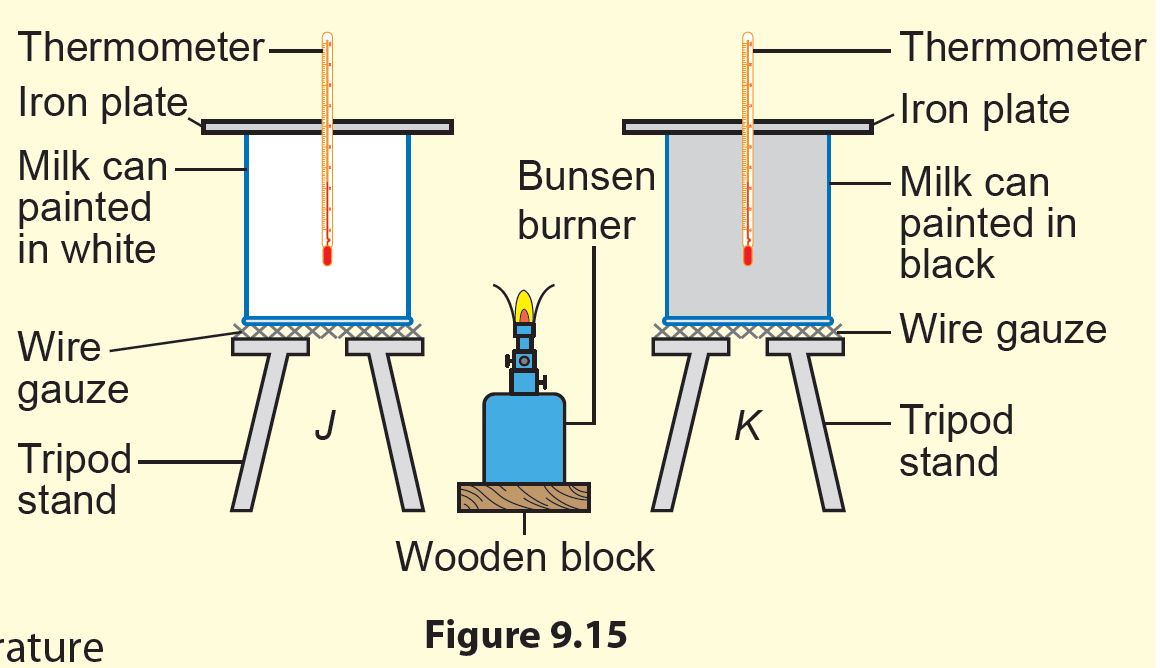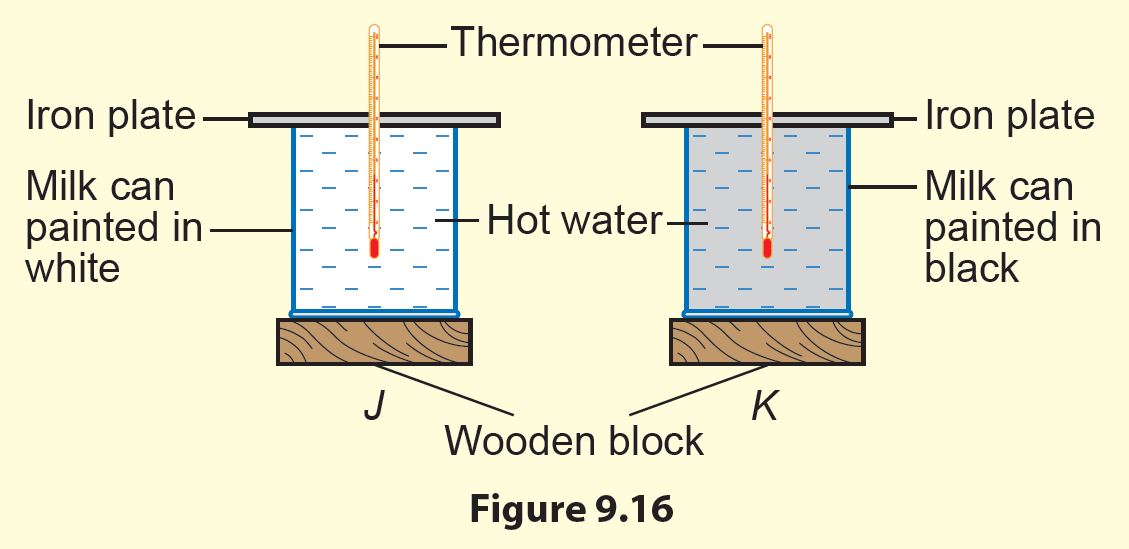Experiment 9.2:
Aim: To study how a dark object absorbs and radiates heat better than a white object.
Problem statement: Do dark objects absorb and radiate heat better than white objects?
Hypothesis: Dark objects absorb and radiate heat better than white objects.
A Good heat absorber
Variables:
(a) Constant variable: Distance from the heat source
(b) Manipulated variable: Colour of surface
(c) Responding variable: Increase in temperature
Materials: Black paint and white paint
Apparatus: Bunsen burner, thermometer, empty milk can, iron plate, wire gauze, tripod stand and wooden block
Procedure:
1. Prepare two empty milk cans, one painted in white and the other in black. Then label the cans as J and K.
2. Set up the apparatus as shown in Figure 9.15 by placing both cans as close as possible to the Bunsen burner.
3. Record the initial temperature of the air inside each can and light up the Bunsen burner.
4. Observe and record the final temperature of each can after 10 minutes.

Observation:

Conclusion:
Is the hypothesis accepted? Give your reasons.
Questions
1. Which can absorbs heat better?
2. What inference can you make from this activity?
Answer:
(A)
1. Can K
2. The temperature in can K increases more after 10 minutes because dark objects absorb heat faster than white objects.
Aim: To study how a dark object absorbs and radiates heat better than a white object.
Problem statement: Do dark objects absorb and radiate heat better than white objects?
Hypothesis: Dark objects absorb and radiate heat better than white objects.
A Good heat absorber
Variables:
(a) Constant variable: Distance from the heat source
(b) Manipulated variable: Colour of surface
(c) Responding variable: Increase in temperature
Materials: Black paint and white paint
Apparatus: Bunsen burner, thermometer, empty milk can, iron plate, wire gauze, tripod stand and wooden block
Procedure:
1. Prepare two empty milk cans, one painted in white and the other in black. Then label the cans as J and K.
2. Set up the apparatus as shown in Figure 9.15 by placing both cans as close as possible to the Bunsen burner.
3. Record the initial temperature of the air inside each can and light up the Bunsen burner.
4. Observe and record the final temperature of each can after 10 minutes.

Observation:

Conclusion:
Is the hypothesis accepted? Give your reasons.
Questions
1. Which can absorbs heat better?
2. What inference can you make from this activity?
Answer:
(A)
1. Can K
2. The temperature in can K increases more after 10 minutes because dark objects absorb heat faster than white objects.
(B) Good heat radiator:
Variables:
(a) Constant variable: Volume of hot water
(b) Manipulated variable: Colour of surface
(c) Responding variable: Decrease in temperature
Materials: Black paint, white paint and hot water
Apparatus: Thermometer, empty milk can, iron plate and wooden block
Procedure:
1. Prepare two empty milk cans, one painted in white and the other in black. Then label the cans as J and K.
2. Fill both cans with hot water as shown in Figure 9.16.
3. Record the initial temperature of the water inside each can.
4. Observe and record the final temperature of each can after 10 minutes.

Observation:

Conclusion:
Is the hypothesis accepted? Give your reasons.
Questions
1. Which can radiates heat better?
2. What inference can you make from this activity?
3. What method of heat flow causes the cans to lose heat?
4. Design an experiment to study whether a dull or shiny object absorbs and radiates heat better.
Answer:
(B)
1. Can K
2. The temperature in can K decreases more after 10 minutes because dark objects radiate heat faster than white objects.
3. Radiation
4. (Student’s answer)
Variables:
(a) Constant variable: Volume of hot water
(b) Manipulated variable: Colour of surface
(c) Responding variable: Decrease in temperature
Materials: Black paint, white paint and hot water
Apparatus: Thermometer, empty milk can, iron plate and wooden block
Procedure:
1. Prepare two empty milk cans, one painted in white and the other in black. Then label the cans as J and K.
2. Fill both cans with hot water as shown in Figure 9.16.
3. Record the initial temperature of the water inside each can.
4. Observe and record the final temperature of each can after 10 minutes.

Observation:

Conclusion:
Is the hypothesis accepted? Give your reasons.
Questions
1. Which can radiates heat better?
2. What inference can you make from this activity?
3. What method of heat flow causes the cans to lose heat?
4. Design an experiment to study whether a dull or shiny object absorbs and radiates heat better.
Answer:
(B)
1. Can K
2. The temperature in can K decreases more after 10 minutes because dark objects radiate heat faster than white objects.
3. Radiation
4. (Student’s answer)